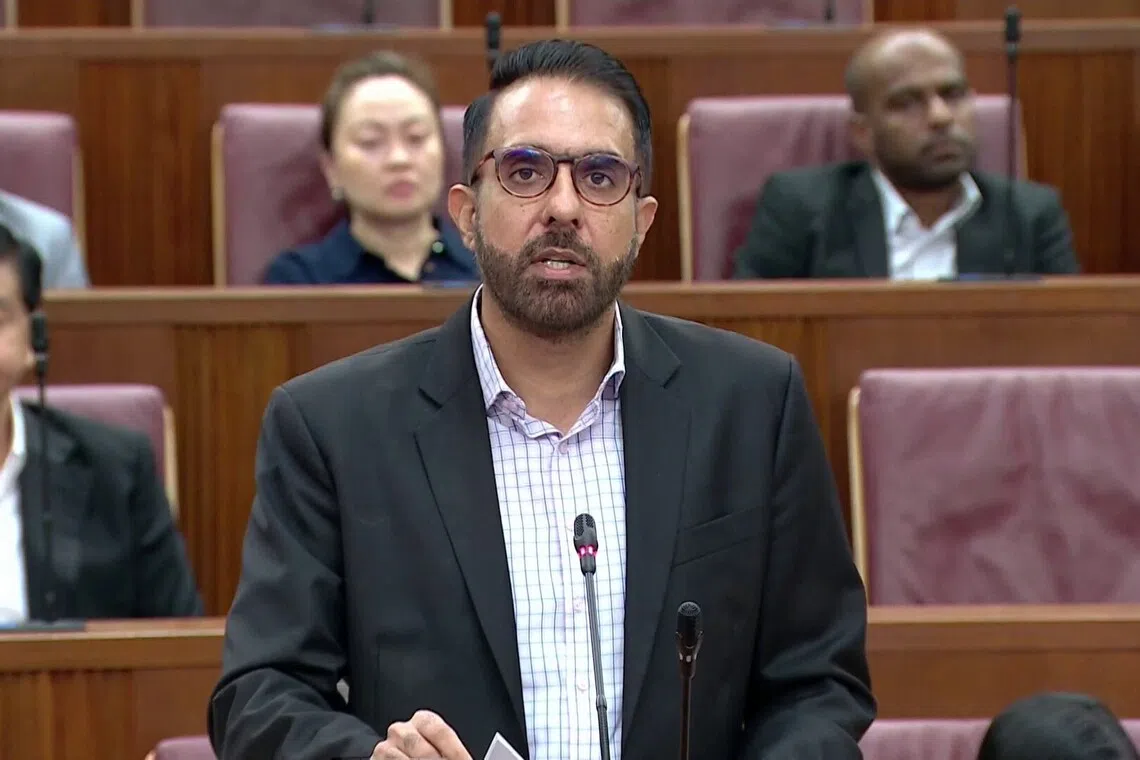WP will focus on checking Govt’s policies to hold it accountable: Pritam Singh
Sign up now: Get ST's newsletters delivered to your inbox

Leader of the Opposition Pritam Singh speaking in Parliament on Sept 22.
PHOTO: MDDI
- Pritam Singh said the opposition will focus on checking government policies and raising alternative proposals
- WP MPs touched on President Tharman's "we first" call, highlighting pressures faced by Singaporeans, including job security and cost of living concerns.
- MPs called for institutional safeguards, dignity for the elderly, and measuring progress beyond the GDP, keeping heritage alive.
AI generated
SINGAPORE – The Workers’ Party will primarily focus on checking the Government’s policies and actions in this term of Parliament, said Leader of the Opposition Pritam Singh.
Checking the government is an essential feature of the Westminster system Singapore adopted from the British, said the WP chief, adding that his party will raise alternative proposals and improvements to existing policies.
“Some Singaporeans think that when we ask questions, we are trying to embarrass the Government,” he said in his speech on day one of the debate on the President’s Address on Sept 22.
“To borrow an old tech phrase – questioning the Government in Parliament is a feature, not a bug.”
Mr Singh (Aljunied GRC) said the WP will not file parliamentary questions to “rack up numbers”, adding that every question posed is “one that needs asking”.
He cited how the party’s MPs have asked about topical issues including housing, jobs, bullying and rail reliability, in line with its role to hold the Government accountable. The party now has 12 MPs, including Non-Constituency MPs – its largest presence in Parliament.
Mr Singh added that the WP welcomes views and suggestions from individuals and organisations to improve policies.
The party believes that the prospect of the opposition raising issues in Parliament has a “strong nudging effect” in getting these recognised and addressed by the Government, he said.
In his speech, Mr Singh also touched on the international and domestic pressures facing Singapore.
He said Singaporeans must brace themselves for turbulence as the country looks to secure its future amid an uncertain geopolitical environment.
Turning to domestic issues, he highlighted concerns over the cost of living and jobs being disrupted by technology.
He noted that technology is rendering jobs obsolete quicker than before, with middle-aged workers who change jobs unable to command the same salaries, and young people finding it tougher to secure good jobs.
Meanwhile, smaller businesses face steep rental hikes that squeeze their profit margins.
Citing the closures of traditional eateries and cinemas as well as the downsizing of bookstores, he said: “All this contributes to a sense of loss that weighs heavily on many Singaporeans... We must try to preserve as much of the different strands of our cultural tapestry in our national interest, instead of resigning ourselves to the inevitability of change.”
Mr Singh also responded to the Government’s call for a “we first” society – a theme that all three WP MPs who spoke in the debate on Sept 22 addressed.
He said that while the idea of “we” is important to Singaporeans, the importance of the individual and his or her place in Singapore should not be minimised.
“‘We’ and ‘me’ are perspectives that exist on a continuum,” he added.
“A binary treatment is limiting, while an overemphasis on one is not consistent with our lived experiences. We should aim for excellence as individuals and venture forth with confidence as individuals, and be respected by society as individuals, regardless of race, language, religion and backgrounds.”
In her speech, Ms He Ting Ru (Sengkang GRC) said she hopes Singapore can measure outcomes by yardsticks other than the gross domestic product. Doing so will help ensure that some things in the public sphere do not change, she added.
“Heritage should be kept alive, including our schools, community spaces, natural spaces that we and our parents went to,” she said.
Mr Fadli Fawzi (Aljunied GRC) said it is unreasonable to expect Singaporeans to think “we first” without helping those who are overworked and overburdened.
He urged the Government to ensure the dignity of the elderly, calling it “unconscionable” that some remain among the working poor, making a living through menial jobs in their 60s and 70s.
Mr Fadli cited cleaners, delivery workers and hawker stall assistants who are “forced” to persist in gruelling labour, despite their old age and health issues.
“It is only when each one of us feels that we are truly valued members of society that we can become a ‘we first’ society,” he said.
Ms He also raised the need for “institutional safeguards” such as an ombudsman, select committees and an independent Elections Department – an issue that the WP has consistently brought up.
Such safeguards also include a clearer perceived neutrality of institutions like the People’s Association, to “ensure public resources are not enmeshed with political goals”, and allowing the media and independent voices to “thrive without the shadow of Pofma overreach”, she added, referring to the Protection from Online Falsehoods and Manipulation Act.
“These are important foundational pillars to ensure that the excesses of no individual person or party can undo the successes we are proud of,” she said.
“We need to ensure our guard rails are robust, while also working to hope our politics never gets to that point of needing them.”



